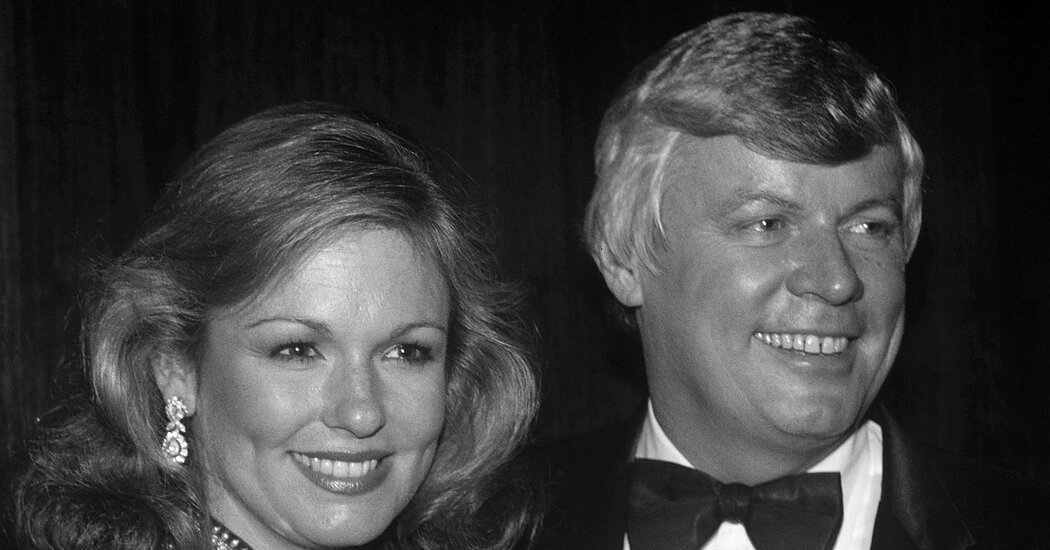John Y. Brown Jr., a born salesman who became a multimillionaire by turning Kentucky Fried Chicken into a global brand and then sold himself to voters in a six-week TV blitz to become Kentucky’s one-term governor served, died Tuesday in Lexington, Ky. He was 88.
His family said the death, in a hospital, was caused by complications from Covid-19.
Mr. Brown, a 30-year-old attorney at the time, and a co-investor purchased Kentucky Fried Chicken from its founder, Harlan Sanders, for $2 million in 1964 (about $19.3 million today). Over the next seven years, he transformed a national string of about 600 restaurants into one of the world’s largest fast-food chains, with some 3,000 red-and-white-striped take-out outlets.
He sold the company to Heublein Inc., the distiller, in 1971 for a personal profit estimated at more than $30 million (about $225 million today).
A prodigious Democratic fundraiser, Mr. Brown, a son of a former congressman and state legislator in Kentucky, initially flirted with a political career, considered a candidacy for the United States Senate before deciding against it at the last minute and then a to bid. for governor in 1975 before refusing to enter the race again.
However, in 1979, recently married to Phyllis George, a pioneering sports reporter and former Miss America, Mr. Brown threw himself into a six-week television campaign for the Democratic governor’s nomination, defeating several candidates by nearly 30 percent. Then, in November, he easily defeated Louie B. Nunn, a former Republican governor.
Hampered by a recession, Mr. Brown amassed a mixed record as the state’s president. Casting himself as “the policymaker and the manager of the finances,” he sought to attract investment by promoting “Kentucky & Co.” as “the state run like a business.” But to keep the state solvent, he had to cut the government payroll by thousands of workers while trying to avoid major service cuts.
“He was a good steward of Commonwealth resources, but he was not a leader who proposed new programs in areas such as education or human resources,” Mary K. Bonsteel Tachau and Bruce L. McClure wrote in “Kentucky’s Governors” (1985) . .
After ending his term in December 1983, Mr. Brown ran for the 1984 Kentucky Democratic primary for a U.S. Senate seat, but withdrew six weeks later, citing the lingering effects of life-threatening heart bypass surgery he underwent. had undergone in his last year as governor. . In 1987, he again sought the gubernatorial nomination, but came in second in the Democratic primary. By then, his luster as a potential national candidate had faded.
His career as an investor had continued after his purchase of Kentucky Fried Chicken. In 1969, he purchased a controlling interest in the Kentucky Colonels from the American Basketball Association. The team won the championship in 1975, but folded when the ABA merged with the National Basketball Association the following year. Mr. Brown then purchased a half interest in the NBA’s Buffalo Braves, a former expansion team.
But when he was blocked from bringing the Braves to Louisville, Ky. (The new owners soon moved the Braves to San Diego and later to Los Angeles as the Clippers.) In Boston, Mr. Brown alienated Loyalists by trading away popular players before selling the team in 1979.
He also founded a roasted chicken restaurant chain with country music star Kenny Rogers, calling it Kenny Rogers Roasters. It grew to 350 outlets, but competition from Kentucky Fried Chicken, then known as KFC, and the Boston Chicken chain (later known as Boston Market) put it out of business in 1998. (It was later bought by Nathan’s Famous.)
John Young Brown Jr. was born in Lexington on December 28, 1933. John Sr. was a trial attorney who served one term in the U.S. House of Representatives in the mid-1930s and was a member of the Kentucky House of Representatives for several years. decades. He lost perpetual races for governor and the U.S. Senate – losses that haunted his son and John Jr. later blamed machine politicians whose support his father had rejected. His mother was Dorothy (Inman) Brown.
He received a bachelor’s degree in 1957 and a law degree in 1960, both from the University of Kentucky, and served in the Army Reserve from 1959 to 1965.
Instinctively entrepreneurial, Mr. Brown earned up to $1,000 a month in high school commissions on a summer job selling vacuum cleaners, and as much as $25,000 a year selling the Encyclopaedia Britannica while in law school.
He was also a high-stakes gambler, a habit rivals would use against him. He was investigated for failing to report a mandatory $1.3 million withdrawal from one of his bank accounts, though he was never charged with wrongdoing.
Mr. Brown’s first marriage, to Eleanor Durall, who was known as Ellie, ended in divorce. In 1973, named president of the Kentucky Colonels after purchasing a majority of the team’s stock, she became the first woman to manage a major professional basketball team.
His marriage to Mrs. George, in 1979, also ended in divorce, in 1998. She died of a rare form of blood cancer in 2020 at the age of 70 after a long career as a CBS sportscaster, in which she broke a barrier in 1975 by join the all-male cast of “The NFL Today” program.
His third marriage, to Jill Louise Roach, a former Mrs. Kentucky, ended in divorce in 2003.
Mr. Brown is survived by three children from his first marriage, Sissy Brown, Sandra Brown Steier, and John Y. Brown III, who served as Kentucky’s Secretary of State in the late 1990s and early 2000s; and two children from his marriage to Mrs. George, Lincoln Tyler George Brown and Pamela Brown, a senior Washington correspondent and weekend anchor for CNN.

